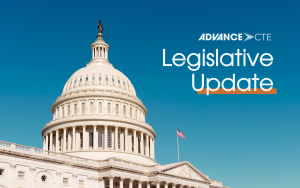
Senators headed back to home states and districts this past weekend as August recess officially began this week for Congress. Elsewhere, the U.S. Department of Education announced new data collection requirements related to postsecondary admissions while the wider department continues to take shape. Prior to recess, bipartisan, bicameral legislation was introduced in Congress, aiming to improve the national postsecondary data ecosystem.
Lawmakers Head Home for August Recess
The annual August recess began in earnest for Congressional policymakers this week, as both chambers are now out of session. This is a time each year that federal elected officials return to their home states and districts for most of the month following a busy summer in Congress. The “One Big Beautiful Bill Act” reconciliation package that took center stage for most of the year was passed by Congress in June and signed into law on July 4. In July, a recissions package clawing back previously enacted appropriations was approved, and efforts to advance fiscal year 2026 (FY26) appropriations started to move forward in earnest.
As shared last week, the Senate Appropriations Committee approved FY26 Labor-HHS-ED legislation, which provides annual funding for the Carl D. Perkins Career and Technical Education Act (Perkins V) and other critical education and workforce development programs. The House Appropriations Committee has not yet considered this appropriations bill for markup, but is expected to when lawmakers return in early September, when fiscal year 2026 (FY26) appropriations will be prioritized.
Advance CTE will continue to engage in the wider FY26 appropriations process and is calling for robust federal investments in Perkins V and other key programs as this process continues to move forward this year. Be sure to check back here for additional updates on appropriations.
Trump Administration Mandates New Postsecondary Admissions Data Collection
Yesterday, the Trump administration issued new data collection directions regarding postsecondary admissions policies and practices. In a related fact sheet titled “President Donald J. Trump Ensures Transparency in Higher Education Admissions”, the administration has indicated that it will require all federally funded postsecondary institutions to submit significant new data regarding their efforts to admit or deny applicants to eligible programs. This new directive seeks to align with the Supreme Court’s 2023 ruling against explicit race-based admissions. It will require data such as race, grade-point average, test scores, and applicant demographics to be reported disaggregated by race, ethnicity, and gender.
U.S Department of Education (ED) Secretary Linda McMahon responded to the directive by instructing the National Center for Education Statistics (NCES) to begin collecting these detailed admissions data from colleges and universities moving forward. The directive from the White House also calls for a revamped online presentation of the data through the Integrated Postsecondary Education Data System (IPEDS) to make it accessible for families and learners. Read the full statement from Secretary McMahon here.
Advance CTE will continue to analyze the impact of executive actions related to postsecondary education and their potential implications on Career Technical Education (CTE) programs at postsecondary institutions nationwide.
College Transparency Act
Just ahead of August recess, Chair of the Senate Health, Education, Labor, and Pensions (HELP) Committee Bill Cassidy (R-LA) and Senator Elizabeth Warren (D-MA) reintroduced the bipartisan College Transparency Act, alongside companion legislation in the House led by Representatives Mike Kelly (R-PA) and Raja Krishnamoorthi (D-IL). The bill aims to modernize the postsecondary data system by repealing a longstanding prohibition on the creation of a student unit record system – one that could offer more reliable, privacy-protected student outcomes data, such as information on enrollment, completion rates, and post-college earnings. The legislation aims to empower learners, families, policymakers, and institutions to make better-informed decisions about higher education.
Advance CTE was pleased to endorse the legislation that will enable learners to make more informed decisions for college and careers. Read the full bill text here.
Trump Administration Continues to Take Shape
Earlier this week, Nicholas Kent was sworn in as the Under Secretary of Education following his confirmation by the Senate. In this role, he will oversee postsecondary, CTE, and adult education programs and federal student aid, including implementing the Trump Administration’s “One Big Beautiful Bill Act”. Read the press release here.
Last week, Penny Schwinn removed herself from consideration for Deputy Secretary of ED. After clearing the Senate HELP Committee, Schwinn will not go before the full Senate for a confirmation vote, but will instead serve as a Senior Advisor and Chief Strategist in the department. This role will not require a Senate confirmation.
Advance CTE will continue to monitor developments for key roles in the Trump administration as they relate to CTE, education, and workforce development policy administration and oversight.
Odds & Ends
- The Justice Department has ended a 44-year-old consent decree from the Luevano v. Ezell case that imposed race-conscious rules on federal hiring exams, originally intended to prevent discriminatory outcomes. Read the press release here.

